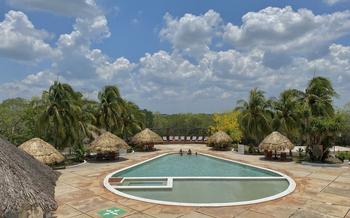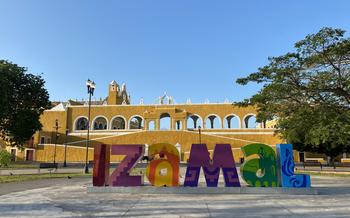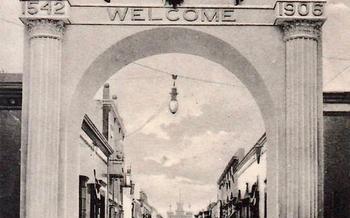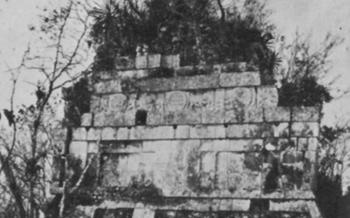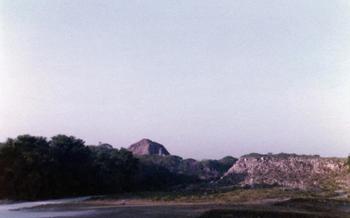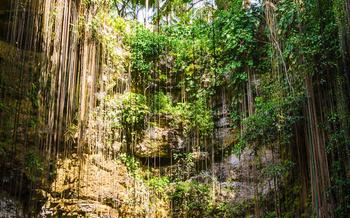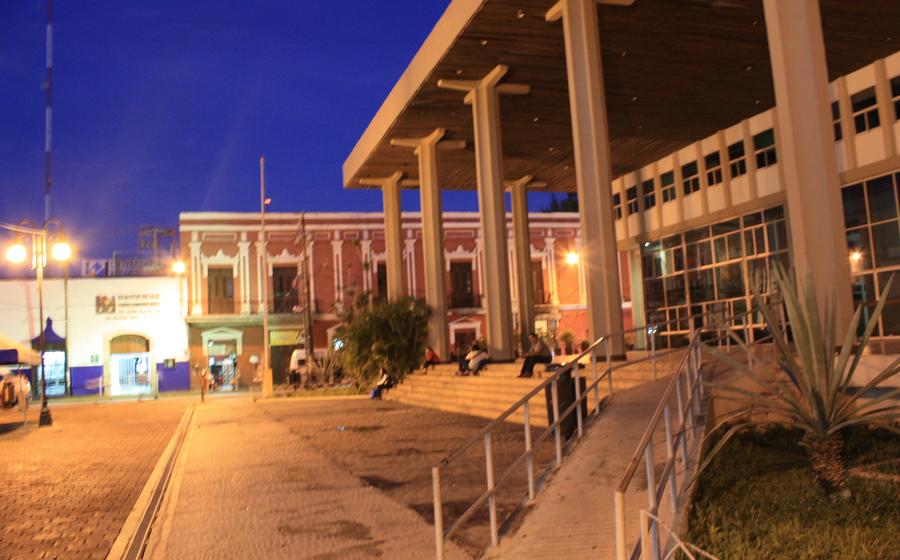
Cenote Zaci
- Historical Significance
- Cenote Zaci: A Natural Wonder in the Heart of Mérida
- Unique Rock Formations
- Marine Life
- Cultural Significance
- History of Cenote Zaci
- Photography Opportunities
- Nearby Attractions
- Local Cuisine:
- Shopping and Handicrafts
- Nightlife and Entertainment
- Insider Tip:
Historical Significance
Mérida, the vibrant capital of the Yucatán Peninsula, boasts a rich history that dates back to ancient times. Explore the ruins of Tiho, a Maya city that predates the iconic Chichén Itzá, and admire its well-preserved temples and pyramids. Delve into the city's colonial heritage as you wander through its charming streets, lined with colorful buildings that showcase a blend of Maya and Spanish architectural styles. Visit the Museo de la Ciudad de Mérida to gain insights into the city's fascinating past and immerse yourself in the vibrant local culture and traditions that make Mérida a truly special destination.
Cenote Zaci: A Natural Wonder in the Heart of Mérida
Cenote Zaci is a captivating natural swimming hole located within the city of Mérida, Mexico. Formed by the collapse of a limestone bedrock, this cenote offers a unique and refreshing experience for visitors seeking respite from the heat and humidity of the city. Easily accessible by foot or public transportation, Cenote Zaci is situated a short distance from the city center, making it a convenient destination for travelers.
The cenote features crystal-clear waters, inviting visitors to take a refreshing dip and cool off. Changing rooms, showers, and a small restaurant are available for the convenience of visitors. Whether you're looking to relax and unwind in the tranquil surroundings of the cenote or capture stunning underwater photographs, Cenote Zaci is a must-visit destination for anyone exploring Mérida.
Unique Rock Formations
At Cenote Zaci, visitors are captivated by the stunning rock formations that adorn its interior. Stalactites, formed by the gradual accumulation of mineral deposits from water dripping from the ceiling, hang like delicate chandeliers from the cave's roof. Stalagmites, their counterparts rising from the floor, meet the stalactites in a mesmerizing dance of stone. These intricate formations, sculpted by centuries of water erosion, create a surreal and awe-inspiring landscape.
The sheer size and grandeur of these rock formations leave visitors in awe. Some stalactites and stalagmites have merged over time, forming massive columns that support the cave's ceiling. Others remain separate, creating a forest of stone that seems to stretch endlessly. The interplay of light and shadow on these formations adds to their allure, casting dramatic silhouettes and highlighting their intricate textures.
Geologically, these rock formations are a testament to the power of water and time. The limestone bedrock of the cenote, composed of calcium carbonate, is slowly dissolved by rainwater seeping through the ground. As the water drips from the ceiling, it leaves behind tiny deposits of calcium carbonate, which gradually accumulate to form stalactites. Similarly, as the water seeps through the floor, it deposits calcium carbonate, forming stalagmites. Over thousands of years, these processes have created the stunning rock formations that grace Cenote Zaci.
Marine Life
Cenote Zaci is home to a diverse array of marine life, making it a haven for snorkelers and divers. As you descend into the cool waters, you'll be greeted by a kaleidoscope of colors and a symphony of movement. Schools of colorful fish, including cichlids, mollies, and guppies, dart in and out of the rock formations, creating a vibrant underwater spectacle. Look out for turtles gliding gracefully through the water or the occasional ray or shark cruising by. The cenote also supports a variety of invertebrates, such as snails, crabs, and shrimp, which play a vital role in the ecosystem. Discover the wonders of the underwater world at Cenote Zaci and gain a deeper appreciation for the incredible biodiversity that thrives in these natural wonders.
Cultural Significance
Cenotes held profound spiritual and cultural significance for the ancient Maya. They believed that these natural wonders were portals to the underworld, known as Xibalba. Cenotes were considered sacred places, and many rituals and ceremonies took place on their banks. The Maya believed that the cenotes were inhabited by deities and spirits, and they often made offerings to these entities to ensure their favor. In addition to their religious significance, cenotes were also important sources of water for the Maya. During the dry season, when other water sources were scarce, the Maya relied on cenotes for their drinking water. Cenotes also provided a place for the Maya to bathe, swim, and fish. Today, cenotes continue to be important cultural symbols for the Maya people. Many Maya communities still hold ceremonies and rituals at cenotes, and they are considered to be places of great spiritual power.
History of Cenote Zaci
Cenote Zaci holds a significant place in the history of the Yucatán Peninsula. It served as a vital water source for the ancient Maya city of Tiho, which predated the more famous Chichén Itzá. The Maya revered cenotes as sacred places and believed they were portals to the underworld. They performed rituals and ceremonies at the cenote, seeking divine guidance and protection.
Throughout history, Cenote Zaci has been used for various purposes. It was a source of drinking water for the Maya and later for Spanish settlers. It was also used for irrigation and agriculture. In the 19th century, the cenote became a popular swimming spot for locals and visitors alike.
In recent years, Cenote Zaci has undergone significant conservation and restoration efforts. The local government has implemented measures to protect the cenote's delicate ecosystem and ensure its preservation for future generations. Visitors can now enjoy the cenote while respecting its historical and cultural significance.
Photography Opportunities
Indulge in the beauty of Cenote Zaci through the lens of your camera. Capture the crystal-clear waters reflecting the surrounding vegetation, creating a kaleidoscope of colors. Experiment with different angles to showcase the impressive stalactites and stalagmites that adorn the cenote. Photograph the vibrant marine life that inhabits the cenote, creating a symphony of colors and movement. Share your captivating images online, inspiring others to embark on their own journey to this hidden paradise. Create a lasting memory of your visit to Cenote Zaci, preserving the beauty of this natural wonder for years to come.
Nearby Attractions
Beyond the allure of Cenote Zaci, the surrounding region beckons with a myriad of captivating attractions. Embark on a subterranean adventure at the Grutas de Loltún, an extensive network of caves adorned with intricate stalactites and stalagmites. Immerse yourself in the history and culture of the region at the Hacienda Sotuta de Peón, a beautifully preserved 19th-century hacienda that offers guided tours and cultural experiences. Discover the rich biodiversity of the Yucatán Peninsula at the Reserva Ecológica Cuxtal, a protected area home to diverse flora and fauna. Plan a day trip to the ancient Maya city of Uxmal, a UNESCO World Heritage Site renowned for its well-preserved ruins and impressive architecture. With so much to explore in the vicinity of Cenote Zaci, you'll be spoilt for choice.
Local Cuisine:
Indulge in the delightful culinary creations of Mérida, where Maya and Spanish influences harmoniously blend to produce a unique gastronomic experience. Sample the iconic cochinita pibil, a slow-roasted pork dish infused with achiote paste and wrapped in banana leaves. Tantalize your taste buds with papadzules, corn tortillas filled with a flavorful combination of eggs, squash seeds, and tomato sauce. Don't miss the opportunity to try panuchos, a traditional open-faced sandwich featuring refried black beans, pulled turkey, and pickled red onions. Immerse yourself in the vibrant local markets, where you can discover an array of fresh produce, aromatic spices, and exquisite handmade crafts. Delight in the culinary treasures of Mérida and savor the authentic flavors of the region.
Shopping and Handicrafts
Immerse yourself in the vibrant shopping scene of Mérida and discover a treasure trove of local handicrafts, souvenirs, and textiles. Explore the bustling markets, where vendors display their colorful wares, from intricate handmade jewelry and pottery to traditional Mayan textiles. Support local artisans and craftsmen by purchasing their unique creations, and take home a piece of Mérida to cherish your memories. Whether you're looking for a special gift or a souvenir to remind you of your trip, Mérida's markets and shops offer an array of authentic and locally made treasures.
Nightlife and Entertainment
Immerse yourself in the vibrant nightlife of Mérida, a city that comes alive after dark. Discover the city's many bars, clubs, and restaurants, each offering a unique atmosphere and experience. Enjoy traditional Yucatecan music and dance performances that showcase the rich cultural heritage of the region. Meet fellow travelers and locals alike in the city's lively plazas and streets, where you can soak up the infectious energy and create unforgettable memories. Whether you prefer salsa dancing at a local club, sipping cocktails at a rooftop bar, or simply strolling through the city's historic center, Mérida's nightlife has something to offer everyone. So embrace the city's infectious energy, let your hair down, and experience the magic of Mérida after dark.
Insider Tip:
For an unforgettable experience, plan your visit to Cenote Zaci strategically. To avoid the throngs of tourists, aim to arrive early in the morning or towards the end of the afternoon, when the sun's intensity has waned. Ensure you pack your swimwear, a towel, and comfortable footwear suitable for navigating the cenote's surroundings. Consider seeking the services of a local guide to delve deeper into the captivating history, cultural significance, and ecological wonders of this natural treasure. Remember to tread lightly and leave no trace of your presence, preserving the pristine beauty of Cenote Zaci for future generations.

